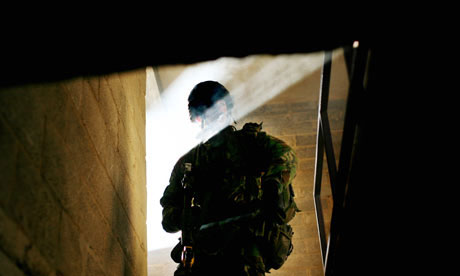
"I left the Army in 2004 and I started to feel different about a year later – I was really short-tempered, snappy, I wasn't sleeping and I started drinking a hell of a lot. I was getting flashbacks and having recurrent nightmares about Bosnia – mostly about the war graves. I knew I needed help as I would get lost in a flashback whilst driving an HGV vehicle at night."
Simon joined the Royal Regiment of Fusiliers at the age of 15, and saw action in Bosnia and Iraq. Five years after leaving the army, he was diagnosed with post-traumatic stress disorder.
Every year a third of the servicemen and women who leave the military will experience mental illness. Many will also experience homelessness, drug or alcohol addiction and unemployment.
I believe volunteering can play a crucial role in supporting these vulnerable men and women. Everyone has a part to play in helping tackle social issues. At TimeBank we identify issues that we feel volunteering can be applied to. Then we develop a project where volunteers are able to get under the skin of that issue and play a vital part in solving it.
TimeBank is partnering with leading military charity Combat Stress to launch Shoulder to Shoulder, the UK's first mentoring project for ex-servicemen and women recovering from mental health issues. Volunteer mentors will add to the ground-breaking treatment and outreach that the charity already does to support ex-servicemen and women recovering from mental health issues – helping them to adjust to life after the military.
I really believe in the power of mentoring and that individual action creates the greatest impact on society. I've mentored in the past and seen first-hand how my fundraising skills and experience as a leader of a charity helped a refugee realise his dream of setting up his own charity project.
Our mentoring projects have been successful in helping some of the most vulnerable people in society.Through Shoulder to Shoulder we're taking our successful mentoring model and applying what we've learned to a new group who find themselves socially isolated and struggle to cope as a result of returning to civilian life after having served in the armed forces.
Combat Stress has a current caseload of 4,500 former servicemen and women, having helped almost 100,000 ex-military personnel in its 90-year history. It is doing some amazing work when it comes to treatment and community outreach work and the addition of a mentor from the community, with a similar background, could help this group integrate and re-settle and ultimately support the recovery of mental illness.
TimeBank will be piloting the project in London for a year and aims to roll it out to other regions where there are more ex-servicemen and women who are in need. It's also thanks to funding from the Department of Health, the Dulverton Trust and the Henry Smith Charity that we will be able to run this project for three years.
We're looking for 70 people from a military background who live or work in London to fill the boots of a mentor. A cup of coffee can be more powerful than you think.
• Helen Walker is chief executive of TimeBank

